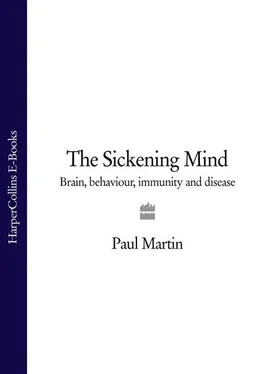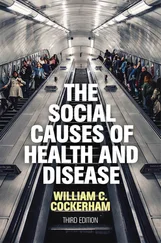We shall see in chapter 5 how psychological stress stimulates the release of hormones, including cortisol, a steroid hormone which suppresses various aspects of immune activity. The stress-induced release of cortisol is controlled by a region of the brain called the hypothalamus. The hormone prolactin is also released in response to psychological stress; unlike cortisol, however, its main effect on immune activity is stimulative.
Chemical communication between the central nervous system and immune system also works both ways. The immune system sends chemical messages to the brain. Immune cells produce neuropeptides, hormones and other chemical messengers, including ACTH, endorphins, encephalins, VIP and growth hormone, which influence both the endocrine and central nervous systems.
Some of the most important messenger molecules mediating the communication between the central nervous system and immune system are the cytokines. These were originally thought to be exclusive to the immune system, but they are now known to act on the central nervous system and endocrine system as well. Scientists have found that cells in several regions of the brain and central nervous system either contain cytokines or have receptor sites for them. When cytokines are released by activated immune cells they can have widespread effects on an organism’s nerves, hormone levels and psychological state. For example, when an infection occurs the cytokine interleukin-1 (IL-1) acts on the brain to induce slow-wave sleep and loss of appetite; IL-1, acting in concert with interleukin-6 (IL-6), induces fever by modulating the temperature control centres in the brain – in effect, putting the body’s thermostat on a higher setting. IL-1 and IL-6 help to make you feel hot, sleepy and indifferent to hunger when you are ill. Cytokines are also active within the endocrine system. The cytokines IL-1, IL-2, IL-6, interferon-gamma and tumour necrosis factor (TNF) are all capable of influencing the release of hormones by the pituitary and adrenal glands.
Small changes to the structure of the brain will produce corresponding changes within the immune system, thus providing further evidence of communication between the two. Highly localized damage (or lesions) to parts of the brain, including the limbic forebrain, hypothalamus, brain stem and cerebral cortex, can bring about specific changes in immune function. Small lesions in the anterior hypothalamus produce reductions in lymphocyte responsiveness, natural killer cell activity and antibody production, while lesions in limbic forebrain structures such as the hippocampus and amygdala can increase the responsiveness of T-lymphocytes. Brain lesions can even modify certain immune-mediated diseases. For example, tiny lesions in the anterior hypothalamus alter the growth of tumours and allergic responses. In addition, animals with certain hereditary defects in their central nervous system are more vulnerable to immunologically-mediated disorders such as arthritis.
A final and fundamental point, to which we shall be returning in subsequent chapters, is that the electrical and chemical communication pathways between the central nervous system and the immune system operate in both directions. Information about the state of the immune system can be passed up to the brain and hence influence the organism’s psychological state.
There is abundant experimental evidence that changes in immune activity are accompanied by corresponding changes in hormone levels, nerve activity and psychological state. Experiments have further revealed that patterns of electrical and chemical activity in the hypothalamus, limbic forebrain and other brain regions are linked to changes in immune activity which occur during the course of an immune response. For example, the peak production of antibodies in reaction to an immunological challenge (inoculation) is accompanied by changes in the electrical activity of nerve cells in the hypothalamus and other parts of the brain. Our brains appear to know, at least to some extent, what is going on within our immune systems.
In conclusion, then, we have seen that our psychological and emotional state can shape our perception of health and hence our sickness-related behaviour. At the extremes we may, like Colin Craven, feel ill and demand medical attention even though we have no disease; or, like Henry Earlforward, we may deny the reality of our symptoms and allow a serious disease to advance unchecked.
But our minds do far more than alter our perception of reality: they alter reality itself. The mind can affect our susceptibility to real physical diseases by modifying our behaviour or by directly influencing our immune defences, to which it is connected via electrical and chemical communications pathways.
By means of these psychological and biological mechanisms our minds really can make us ill.
O the mind, mind has mountains; cliffs of fall
Frightful, sheer, no-man-fathomed. Hold them cheap
May who ne’er hung there.
Gerard Manley Hopkins, No worst, there is None (1885)
Evolution has equipped our bodies with psychological and biological mechanisms which enable the brain and immune system to talk to each other. Let us now examine what happens when these mechanisms operate in practice. In this chapter we shall look at what the immune system can do to the mind and, conversely, what the mind can do to the immune system. We shall see that changes in a person’s mental state can affect their immune function and vice versa. Then we have the remarkable phenomenon of immune conditioning, which teaches the immune system to respond to purely psychological stimuli. We shall explore the curious connections between left-handedness, developmental learning disorders and immunological diseases. To round off the story we shall study in closer detail one specific instance of how mind, body and health interact, by considering herpes virus infections.
What can the mind do to the immune system?
Let us start with the most basic of psychoneuroimmunological questions. (The question is much simpler than its epithet.) What effects do psychological factors actually have on the immune system?
Probably the first ever scientific account of a psychoneuroimmunological phenomenon appeared in 1919, when a Japanese scientist called Ishigami published the results of his research on tuberculosis in schoolchildren. Ishigami observed that an increase in tubercular illness coincided with a period when the children and their teachers were experiencing high levels of ‘emotional excitement’. Using a crude immunological measure – the ability of white blood cells to destroy foreign bacteria – Ishigami was able to relate this upsurge in disease to a decline in immune function. He concluded that the emotional stress was responsible for the decline in immunity which, in turn, led to the increased incidence of disease.
Since Ishigami’s day, and especially since the 1980s, scientists have accumulated a huge and varied pool of evidence that psychological and emotional factors influence the immune systems of humans and other species, with consequential effects on physical health. 1 It is time to look at a few examples.
BEREAVEMENT AND NUCLEAR DISASTERS
The death of a spouse or partner is one of the most devastating forms of psychological and emotional disturbance anyone can experience. It is also surprisingly common, affecting more than 800,000 people each year in the USA alone. By the age of sixty-five over 50 per cent of American women have been widowed at least once.
Bereavement considerably heightens the risks of death and disease for the surviving partner. The risks are particularly great if the surviving partner is male: widowed men in their twenties have a mortality rate seventeen times higher than comparable married men. Moreover, the increased mortality rates among widowers persist for several years after the death of their wife.
Читать дальше












